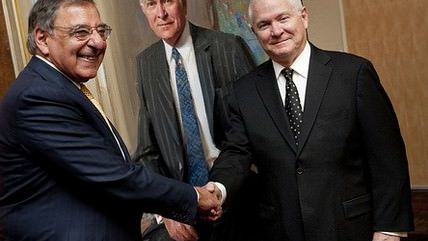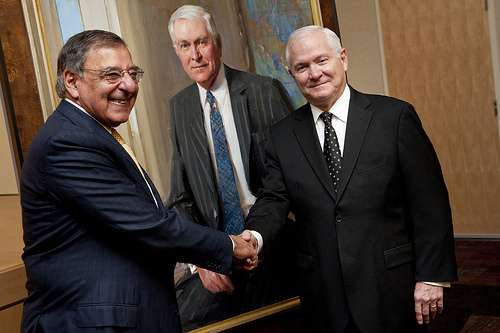Gates and Panetta Criticize Obama's Response to Chemical Attacks in Syria


Speaking at Southern Methodist University in Dallas Obama's first two secretaries of defense, Robert Gates and Leon Panetta, both criticized the president's response to the ongoing crisis in Syria, saying that they would not have asked for Congress to approve a military intervention in the wake of the chemical attacks in some Damascus suburbs on August 21. Gates, who was the last secretary of defense of George W. Bush's cabinet, said that Obama's plans for limited strikes against Syria were a mistake, while Panetta said that a military intervention should have taken place, citing the potential damage inaction could do to America's reputation given Obama's "red line" comment last year.
From The New York Times:
"My bottom line is that I believe that to blow a bunch of stuff up over a couple days, to underscore or validate a point or a principle, is not a strategy," Mr. Gates said during a forum at Southern Methodist University in Dallas. "If we launch a military attack, in the eyes of a lot of people we become the villain instead of Assad," he added, referring to President Bashar al-Assad of Syria.
Mr. Gates, the only cabinet member from the administration of George W. Bush whom Mr. Obama asked to stay on, said missile strikes on Syria "would be throwing gasoline on a very complex fire in the Middle East."
"Haven't Iraq, Afghanistan and Libya taught us something about the unintended consequences of military action once it's launched?" Mr. Gates said.
Mr. Panetta, also speaking at the forum, said the president should have kept his word after he had pledged action if Syria used chemical weapons.
Although not a fan of plans for limited strikes Gates is by no means a non-interventionist. The New York Times goes on to report that Gates supports sending military equipment to some of Assad's opposition as well as imposing sanctions on some members of the Syrian government and Assad's family.
The U.S. and Russia recently agreed to a deal regarding Syria's chemical weapons arsenal. The deal requires that Syria's chemical weapons be destroyed by mid-2014. According to Foreign Policy, officials from Western nations are asking that Russia destroy Syria's chemical weapons on its own soil, a process that could potentially take place at a chemical weapons demilitarization plant 1,000 miles southeast of Moscow that was partly funded by the U.S. and other Western nations.


Show Comments (12)